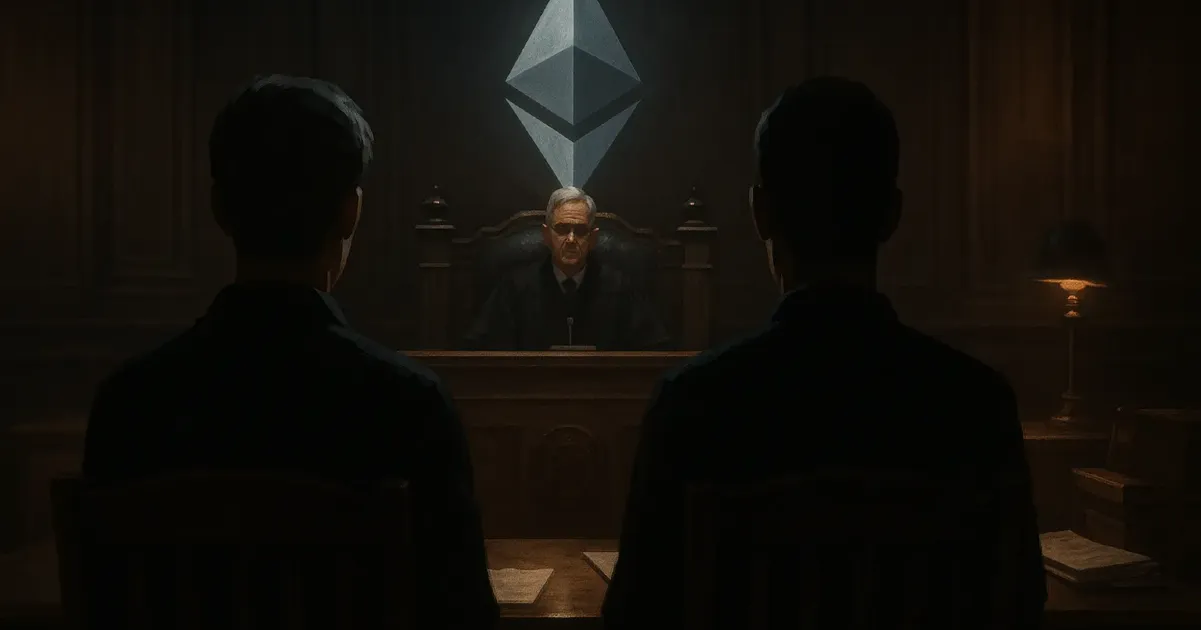Roman Storm faces up to 5 years in prison after being found guilty of running an unlicensed money transmission business.
A Mixed Verdict for Tornado Cash’s Co-Founder
After four days of deliberation, a Manhattan jury has delivered a partial verdict in one of the crypto world’s most closely watched legal cases. Roman Storm, co-founder of privacy protocol Tornado Cash, has been found guilty on one of three felony charges brought against him.
The verdict came after the jury admitted they were deadlocked on the remaining charges, prompting Judge Katherine Failla to issue instructions urging them to reach a consensus. While the jury eventually found Storm guilty of conspiring to operate an unlicensed money transmission business, they could not agree on the two other charges: conspiracy to launder money and conspiracy to violate North Korean sanctions.
The charge he was convicted on carries a maximum sentence of up to five years in prison.
What Was the Case About?
Storm, along with fellow Tornado Cash developer Roman Semenov (still at large), was accused of creating and operating a crypto privacy tool that enabled illicit actors to launder billions in digital assets, including state-sponsored hackers from North Korea.
The U.S. Department of Justice claimed that Storm had both the authority and technical capability to prevent misuse of Tornado Cash but chose not to.
The prosecution leaned heavily on testimonies from FBI agents, IRS investigators, and cybersecurity experts, some of whom even had ties to hacking communities. They portrayed Storm not just as a developer, but as someone with oversight and accountability.
Storm’s defense team hit back, calling expert witnesses, including Ethereum core developer Preston Van Loon and Matthew Edman, co-founder of privacy firm NAXO. They argued that Storm was simply an open-source developer who could not control how the technology was used after it was deployed.
What Charges Did Storm Face?
Roman Storm had been indicted on three major federal counts:
- Conspiracy to operate an unlicensed money transmission business ✔️ (Guilty)
- Conspiracy to commit money laundering ❌ (No verdict reached)
- Conspiracy to violate U.S. sanctions related to North Korea ❌ (No verdict reached)
He pleaded not guilty to all counts and was out on bail since August 2023.
With Wednesday’s decision, only the first charge stuck, but it’s a felony nonetheless and could result in significant prison time.
Why Is This Case a Big Deal?
The case represents a major legal flashpoint between open-source developers and government regulators. Storm is one of the first crypto developers in the United States to be criminally charged for writing code that was later used by malicious actors.
It’s not just about privacy tools or Tornado Cash anymore; it’s about whether building decentralized software makes you legally liable for how that software is later used.
Storm’s case is being watched globally because it could set a precedent for how the U.S. treats crypto developers moving forward.
Will Roman Storm Go to Jail?
That decision hasn’t been made yet.
Judge Katherine Failla, who presided over the trial, has not scheduled a sentencing hearing, though one is expected in the coming weeks. Storm could face up to five years for the charge he was convicted on.
Failla hinted that she’s factoring in prior high-profile crypto trials in her deliberations. She specifically referenced:
- Sam Bankman-Fried (FTX)
- Nathaniel Chastain (OpenSea)
- Karl Greenwood (OneCoin)
Each of these individuals ended up receiving prison sentences after their convictions, suggesting that Storm’s chances of avoiding jail time might be slim.
Storm’s Defense Fund and Community Support
Despite the looming verdict, Roman Storm has not stood alone.
The crypto community rallied behind him, raising more than $3 million to fund his legal defense. Major contributors included:
- Vitalik Buterin, co-founder of Ethereum
- Matt Huang, founder of Paradigm
- The Ethereum Foundation
This overwhelming support highlights a deep divide between regulators and the crypto development community. Many see Storm’s trial as a dangerous overreach, potentially chilling innovation in the space.
What’s Next?
Although two of the three charges ended in a hung jury, the guilty verdict on the first charge could still be career-defining for Storm. Beyond potential prison time, it sends a loud warning to builders in Web3 that open-source is not off-limits from legal scrutiny.
Storm's legal team has not yet commented on whether they will appeal the conviction, but many observers expect that to be the next move.
The partial deadlock, however, leaves room for future litigation or retrials on the remaining charges.
A Tipping Point for Crypto Privacy?
The Tornado Cash case has been called a "canary in the coal mine" moment for decentralized development.
Storm’s conviction for simply helping build a privacy tool may accelerate calls for clearer legislation, developer protections, and defined limits of liability in crypto.
At the same time, the U.S. government is showing that it’s willing to take an aggressive stance, especially when national security or sanctions come into play.
Whether that chills innovation or catalyzes smarter regulation remains to be seen.
Final Thoughts
Roman Storm now awaits sentencing for a conviction that could reshape crypto development in America.
While the jury didn’t unanimously agree on all charges, the message is clear: if you build tech that can be used illegally, you could be held accountable even if you didn’t intend harm.
This case could mark the beginning of a new legal era for crypto, one where the line between code and crime grows thinner by the day.
Related Articles

MIT Brothers Behind $25M MEV Bot Exploit Face Trial in October

House Clears Path for Crypto Legislation: Stablecoins, Market Structure, and CBDC Ban in Focus




